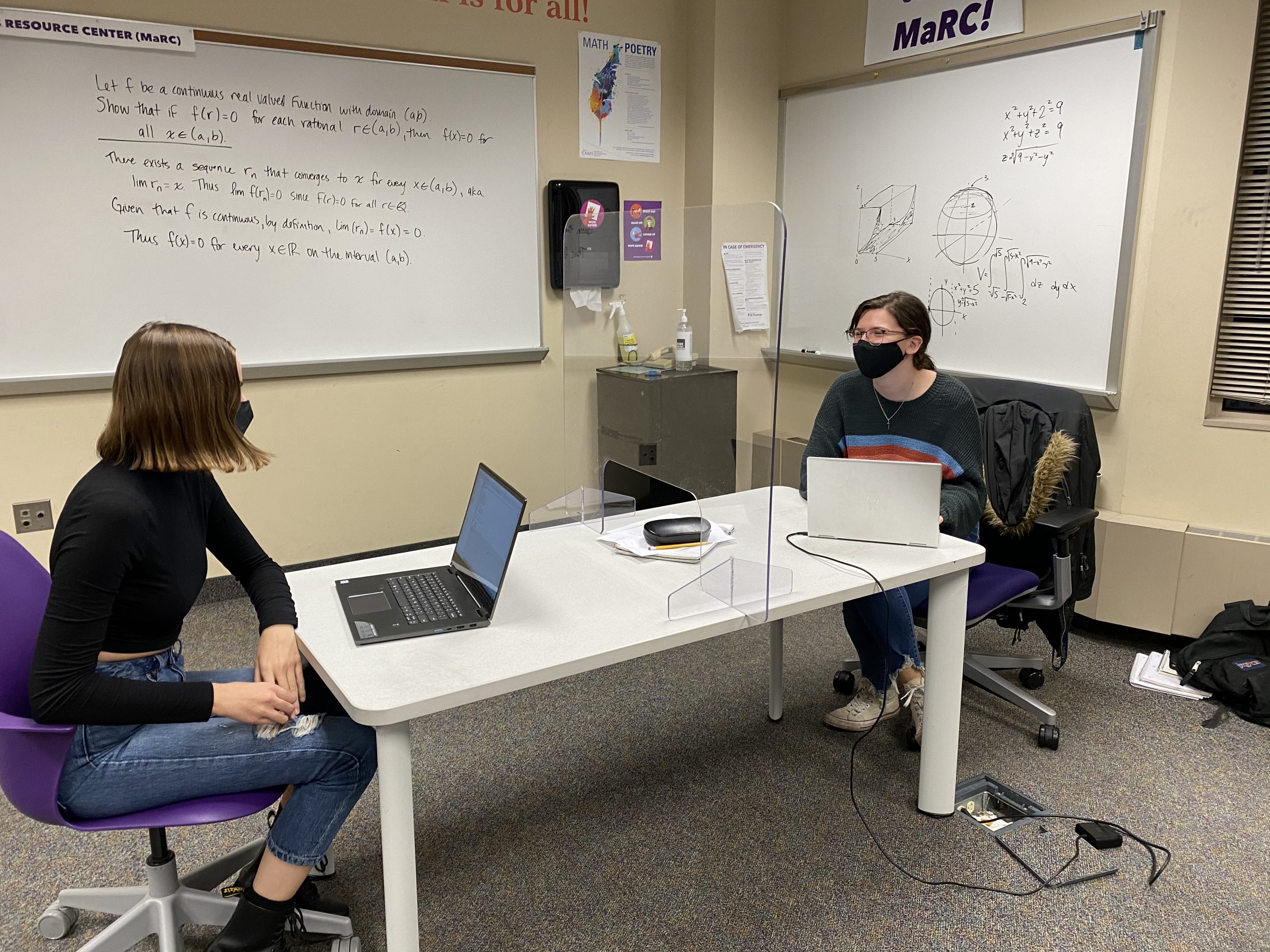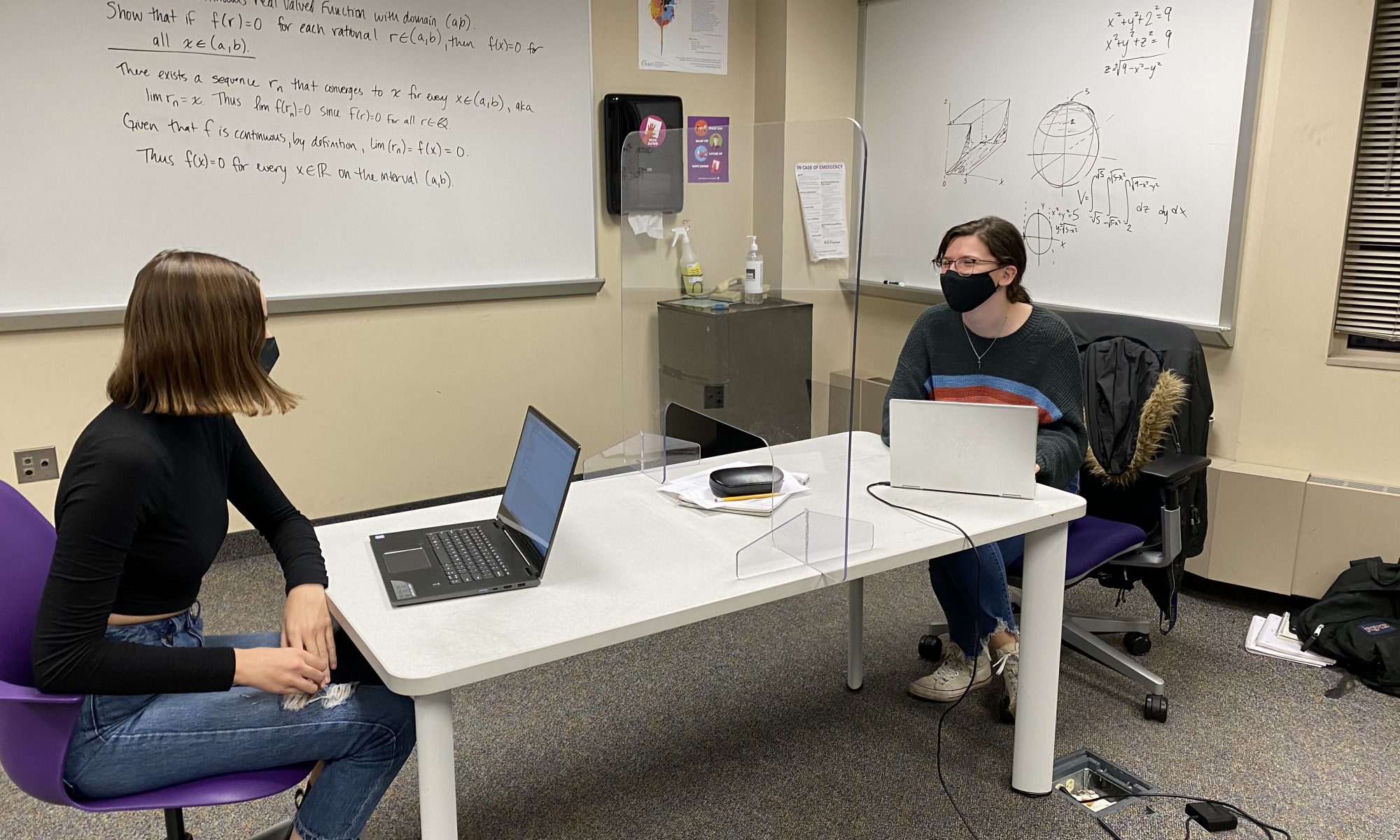
Junior Sarah Chock helps tutor mathematics at the MaRC. Tutoring services at St. Thomas, such as the Mathematics Resource Center and the Center for Writing, are making the most of their service since students have moved back to campus. (Scout Mason/TommieMedia)
Tutoring departments at St. Thomas have made the most of their services since students have moved back to campus, including adding plexiglass dividers to get students back in person as well as adapting to Zoom for online tutoring.
The Mathematics Resource Center (MaRC) and the Center for Writing have proactively adapted since the transition to online tutoring in March. The MaRC was the first tutoring service to include some in-person drop-in hours while following Centers for Disease Control and Prevention and St. Thomas guidelines until the announcement of the quiet period. The MaRC still allows in-person hours by appointment.
“I think we’ve made the most of (online tutoring), and I think we’ve all improved greatly since last semester,” math tutor and senior Kai Olson said. “We’d prefer everything in-person obviously, without COVID, but it’s as good as it can be.”
MaRC Director Molly Peterson said the MaRC and other tutoring services still see fewer students than before the pandemic but are trying to use outside resources to market their services.
With all these changes, Olson said he’s excited to keep moving toward the MaRC’s pre-COVID operations.
“Taking away that personal interaction made it more challenging,” Olson said. “It’s nice to be able to just be in person.”
Although Olson said the process has been difficult, he is happy online resources haved allowed tutoring to continue.
“I think that tutoring in the online world has helped me to enjoy my time better because I get to do something normal again and talk to people to help them out,” Olson said. “I have enjoyed learning to adapt.”
Last spring
When in-person instruction moved online in the spring, the MaRC was forced to move its tutoring schedule to Zoom.
“When COVID initially hit, (MaRC staff members) took our drop- in, in-person hours and we moved them to online drop-in hours,” Peterson said.
Susan Callaway, director of the Center for Writing, explained that she and her staff had to use resources such as written feedback over Zoom, a feature that was still new to them.
“We pivoted entirely,” Callaway said. “We really needed to do something that we had only been doing a little bit before.”
Tutoring departments had to resume operations as soon as possible by setting up new appointment systems and using ongoing Zoom meetings for drop-ins.
“The way we did it was, we just had a continuous Zoom meeting and then a student would just click a link on the website and join,” Olson said. “If a tutor was free, they’d join a breakout room together.”
Callaway said the Center for Writing numbers dropped due to the challenges that came with students moving off campus while also adapting to online instruction.
“It really wasn’t the same, and it was harder to communicate ideas,” Olson said. “I think we had fewer people come in for tutoring because people just weren’t as interested in the online tutoring world.”
Despite the tough shift, Peterson believes her tutors did a great job of moving online and finding ways to use new resources; however, the lack of human interaction took a toll.
“We were lonesome, completely lonesome for each other so it was a hard spring,” Callaway said. “I think (the tutors) feel, as we all do, isolated.”
Because of the loneliness, Callaway had to make meetings with her staff as normal as possible.
“We did happy half-hours because seniors were going to graduate, so we’d all go to their hours and hang out with them,” Callaway said.
Departments used the rest of the spring semester to try to rework their systems to help students and also train tutors so they could adapt to the online world. Before starting the mountains of work, Callaway told her department, “we need to be sane.”
“It was very stressful to be responsible for 20 people,” Callaway said. “I needed to train the consultants in dealing with texts when they’re used to dealing with people.”
Scout Mason can be reached at maso7275@stthomas.edu.



